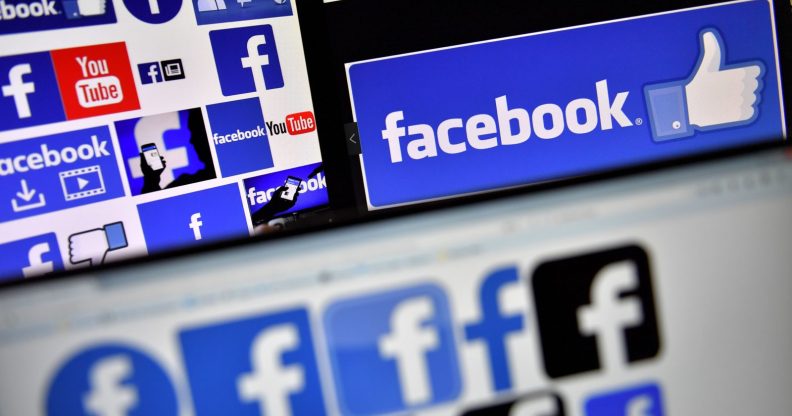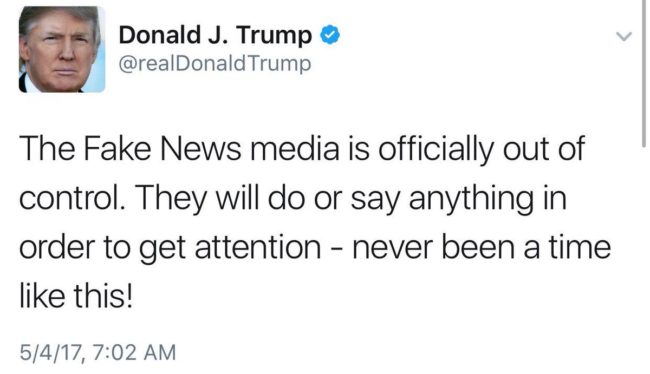Facebook’s trustworthiness tool could be dangerous for LGBT+ rights

Being connected to different groups on Facebook can be challenging (LOIC VENANCE/AFP/Getty Images)
Since Facebook announced plans to disseminate a survey to its users to determine the trustworthiness of news publications, questions about how this will affect the LGBT+ community and other vulnerable groups have come to light.
As members of the public could be given the opportunity to vote that a publication is less trustworthy if they disagree with its views, it could result in LGBT+ media becoming less visible and leave members of the community open to scrutiny.
With experts asking Facebook to ensure that it “won’t leave LGBT+ people and other vulnerable groups even more open to persecution and misinformation,” PinkNews has examined the purpose of Facebook’s trustworthiness tool, and how it can affect LGBT+ publications and the people who read them.
What is the Facebook trustworthiness tool?
Facebook has announced that it intends to introduce a tool that ranks the trustworthiness of publications that post news on the social media platform.
Through the use of a survey which addresses users, it will identify how “trustworthy” these community members believe the content to be.
Facebook will then gather and aggregate these results to give each news outlet a ranking.
The survey in full is listed below:
Do you recognize the following websites
Yes
No
How much do you trust each of these domains?
Entirely
A lot
Somewhat
Barely
Not at all
As a consequence, users will see more posts from “more trustworthy” news sources, and fewer from “less trustworthy” news sources.
The outlets will be ranked on how trustworthy their news articles are, how useful they are for finding out information and how relevant they are to people’s local communities.

(Getty)
Why is it coming into action?
Mark Zuckerberg wrote in a Facebook post outlining the move that the rule will address “sensationalism, misinformation and polarisation,” which he said there was “too much” of in the world.
“Social media enables people to spread information faster than ever before, and if we don’t specifically tackle these problems, then we end up amplifying them,” he said.
“That’s why it’s important that News Feed promotes high quality news that helps build a sense of common ground.”
In short, Zuckerberg says that he is introducing the rule to mediate the spread of “fake news“, which in its purest form, is a term used to define websites that create fake content in order to make advertising revenue.
However, the origin of the term “fake news” is rarely used. More commonly, it is associated with President Trump, who uses the term to rubbish news platforms who he disagrees with.
With this in mind, what happens if a surveyed Facebook user disagrees with the content on a news platform?

An example of fake news in action
Why is the Facebook trustworthiness tool such a cause for concern?
The main conversations about the launch of the new trustworthiness rule revolve around two key issues: how the survey is carried out and moderated, and how Facebook can account for sending out the survey to potentially biased members of the public.
At the time of publication, Facebook has not clarified how the survey will be disseminated, moderated, or whether an independent adjudicator will be in place to assess the fairness and findings of the survey.
The fact that the trustworthiness of the news is determined by someone with both conscious and subconscious biases and prejudices could mean the result are open to manipulation by those who do not agree with specialist news sites.
News is not a matter of taste – it is information produced as accurately as possible in order to inform and communicate with the public.
In the case of PinkNews, which produces content on lesbian, gay, bisexual, transgender and other members of the community, we work with an awareness that our readers and our audience face discrimination and prejudice even in the way they carry out everyday tasks in their lives.
And for specialist news platforms like PinkNews and others, placing news under the scrutiny of potentially homophobic and transphobic “selected” members of the Facebook community could pose a serious problem – and make content like this less visible to the people who need it.
“Facebook need to give a lot more detail on how this process will work, and quickly. Truth isn’t statistical, and it certainly isn’t just the same as popular opinion, especially when the news so often gets into questions of rights and morality,” says Pulitzer Prize-winning journalist James Ball.
“In 1983, only 11 percent of the British public said gay sex was “never wrong” – but gay rights have come along spectacularly since then, thanks to the work of campaigners and of hard-working journalists reporting what was true, not what was popular. If Facebook’s trust system had been in place then, would we have come so far, so fast?
“Facebook is trying to tell us that their system is more advanced than this, and won’t be able to be exploited in this way. We need much more than vague reassurances on this – we need independent checking and public details to make sure Facebook won’t leave LGBT+ people and other vulnerable groups even more open to persecution and misinformation,” he added.

What have the experts said?
“We’re keen to see measures in place to ensure news rating systems aren’t abused by homophobic, biphobic or transphobic trolls targeting LGBT+ websites and publications. Social media platforms can be a valuable source of information and connection for lesbian, gay, bi and trans people, particularly in countries where being LGBT+ is illegal or culturally taboo,” said a Stonewall spokesperson.
“I think any moves which help Facebook tackle the rise in fake news and misinformation – whether deliberate or not – have to be welcomed. But it would have to be robust enough so that all users – including media outlets – could be confident that the system wasn’t being abused,” says News Associates’ Head of Journalism, Andrew Greaves.
“I would hate to see a situation where news from minority sections of society was being suppressed because of the malicious agendas of those who don’t agree with what is being written.
“Freedom of speech and expression is a cornerstone of any democracy and a media industry in the UK which is free to criticise and to hold to account is something we should hold dear,” he added.
Benjamin Cohen, Chief Executive of PinkNews Media Group said: “The changes that Facebook is making could lead to homophobes being asked to evaluate the ‘trustworthiness’ of LGBT+ media.
“If large numbers of people tell Facebook that a publisher is untrustworthy, its content could be restricted for distribution on the Facebook newsfeed.
“This is unhealthy for democracy and for LGBT+ rights. I urge Facebook to issue greater clarity about how LGBT+ and other minority media will not unintentionally be discriminated against as a result of its policy changes.”
Facebook has been contacted for comment.

